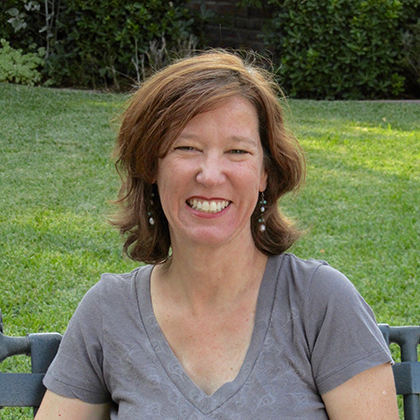University of Redlands Emergency Alert System
Alert Received: . For more information, visit: https://www.redlands.edu/alert/
University of Redlands

Ph.D. Biochemistry, UC Berkeley;
B.S. Biology, Cornell University
Biology, Hedco Hall
107
P: 909.748.8526
P: 909-748-8920
E:
linda_silveira@redlands.edu
Current Research, Academic Interests and Areas of Expertise
My interests lie in the microscopic world of the cell and its genes. In my research my students and I explore the regulation of cell division, creating mutant yeast strains that can no longer divide. Studies of these yeast mutants identify factors that affect cell division, some of which are also found in humans. This work is patterned on the Nobel-prize winning work of Leland Hartwell.
I have published two laboratory projects designed for my courses (one of these was designed and published jointly with a colleague, Ben Aronson). Both projects explore how variations in DNA can affect the appearance, ability, or behavior of an organism. Because patterns in DNA structure tell cells how to build proteins, and proteins carry out most of the cell's functions, alterations in DNA can have profound effects on organisms.
The first, about the "God Gene," describes a project conducted in an interdisciplinary Proudian seminar. In his book, The God Gene, Dean Hamer describes a correlation between a particular DNA sequence (the order in which DNA units are hooked together in a chain) and scores on a personality test that measures openness to spiritual experience. He posits that at least some degree of our ability to embrace spirituality is innate, and a tiny fraction of that may be due to this particular DNA sequence. Students in the Proudian course determined the sequence of a portion of their own DNA, completed the personality test, and looked at the results to determine if such a correlation between DNA sequence and personality test scores existed in our class. We also debated the merits of Hamer's approach.
The second project, developed jointly with Ben Aronson, is part of our introductory course for biology majors. In this project students mutate yeast cells, resulting in a few strains that have an altered appearance – they are red instead of cream-colored. Over the course of the five-week project, students develop a hypothesis as to what part of the yeast's DNA could have been altered to result in this change. Students finish the project by looking at the DNA sequence of candidate regions of yeast DNA to determine whether their hypothesis was correct.
BIOL 131 Principles of Biology
BIOL 338 Cell Biology
BIOL 343 Microbiology
BIOL 103 Issues and Techniques in Genetic Engineering
BIOL 403 Research in Cell and Molecular Biology
Aronson, B.D. and Silveira, L. A. (2009) From Genes to Proteins to Behavior: A Laboratory Project That Enhances Student Understanding in Cell and Molecular Biology. CBE-Life Sciences Education 8: 291-308.
Silveira, L. A. (2008) Experimenting with spirituality: analyzing The God Gene in a non-majors biology course. CBE-Life Sciences Education 7: 132-145.
Co-chair, Education Initiative Forums at the American Society for Cell Biology annual meeting, December 2001, 2002, 2003, 2004, 2005, 2006, 2007.
Education Workshop Co-chair: New paradigms in teaching introductory and cell biology. Continuing the dialogue on genomics: a revolution in progress. At the American Society for Cell Biology annual meeting, San Francisco, CA, December 9, 2000.
Silveira, L.A., Smith, J.L., and Spudich, J.A. (1998) Myosin light chain kinase A, an unconventional myosin light chain kinase from Dictyostelium, is activated by a cGMP-dependent pathway. Proc. Natl. Acad. Sci. (USA) 95: 13000-13005.
American Society for Cell Biology, Transitions to Independence: Cell Biology Training for Today's Job Market, panel at annual national meeting. December 15, 1998.
Smith, J.L., Silveira, L.A., and Spudich, J.A. (1996) Myosin light chain kinase gene disruption in Dictyostelium: A role for MLCK in cytokinesis and evidence for multiple MLCKs. Proc. Natl. Acad. Sci. (USA) 93: 12321-12326.
Smith, J.L., Silveira, L.A., and Spudich, J.A. (1996) Activation of Dictyostelium myosin light chain kinase A by phosphorylation of threonine-166. EMBO J. 15: 6075-6083.
2000-2004: National Science Foundation Research at Undergraduate Institutions (NSF RUI) Grant: Isolation and Characterization of Cell Cycle Mutants from Kluyveromyces lactis
1998: Outstanding Teaching Award, University of Redlands
1994-2009: University of Redlands Faculty Research Grants
American Society for Cell Biology member
American Society for Cell Biology, Education Committee, 1999- 2007